A Cleveland Clinic dietitian says these sips may help drop a few pounds of water weight, sometimes in as little as one to two days.
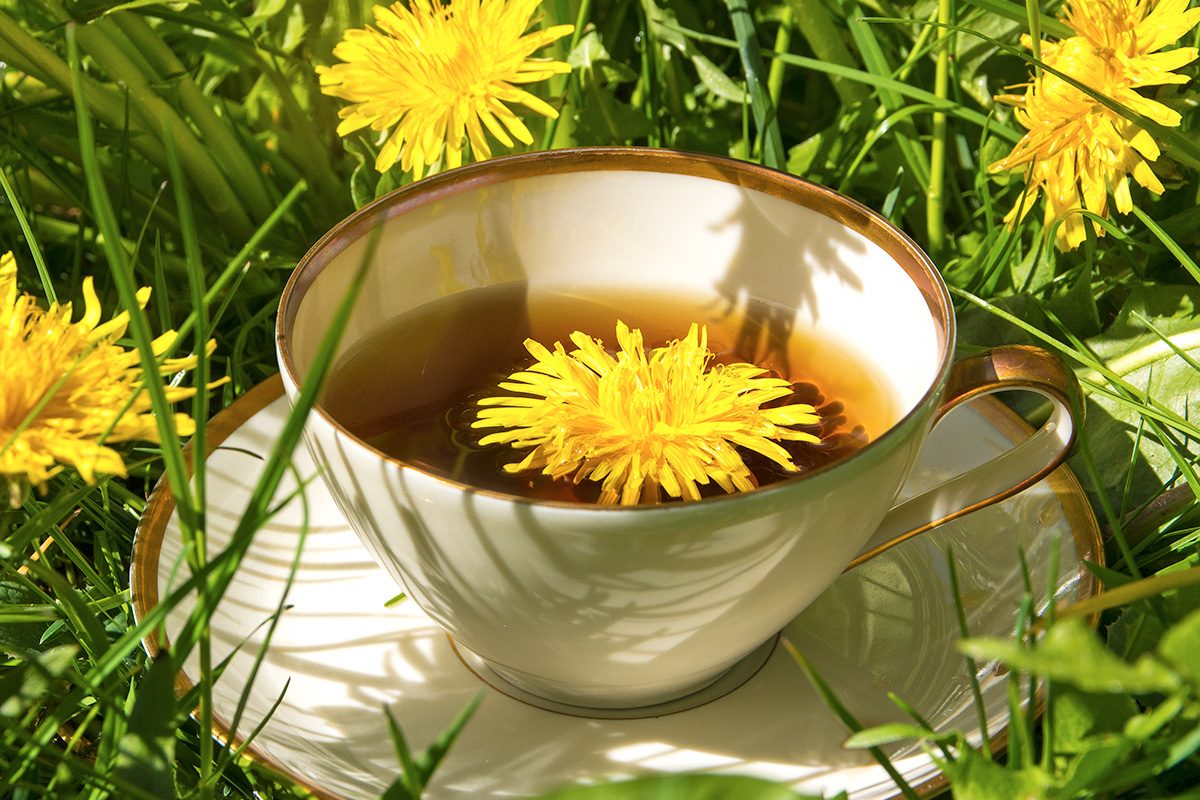
9 Drinks That Can Help You Lose Water Weight Instantly, from a Cleveland Clinic Expert

What causes water weight?
Water retention can be triggered by a variety of everyday habits and physiological changes. Here are some of the most common culprits behind sudden water weight gain:
- High sodium intake: Eating salty foods causes your body to hold onto water. This is the body’s natural way of working to dilute the excess sodium in your bloodstream.
- Dehydration: When you don’t drink enough water, your body holds onto fluid to prevent further loss.
- Hormonal fluctuations: Shifts in estrogen and progesterone, especially before your period, can cause temporary swelling and water retention.
- Sedentary behavior: Sitting or standing still for too long causes fluid to pool in your lower extremities, especially in the legs and ankles.
- Medications: Some medications, including NSAIDs, certain antidepressants, and blood pressure medications, can lead to fluid retention as a side effect.
- Excess carbohydrate intake: Your body stores glycogen (carbohydrates) with water, so eating a lot of carbs can cause temporary weight gain due to stored water.
What to drink to shed water weight
Staying well-hydrated helps your kidneys flush out excess fluid and sodium. But some beverages go a step further by actively supporting fluid balance and reducing bloating.
Certain drinks act as mild diuretics, increasing urine output and helping your body shed retained water. Others are packed with potassium and other electrolytes that help balance out sodium levels and prevent further water retention. “Potassium is an important electrolyte that helps regulate fluid balance,” Zumpano says. “It counteracts sodium by increasing excretion and urine output.”
When combined with a low-sodium diet and regular movement, these beverages can help reduce puffiness and drop a few pounds of water weight, sometimes in as little as one to two days.
Below, we break down the top expert-approved drinks to help you flush excess fluid, feel lighter, and beat the bloat naturally. Consult your healthcare provider before adding anything new to your routine.
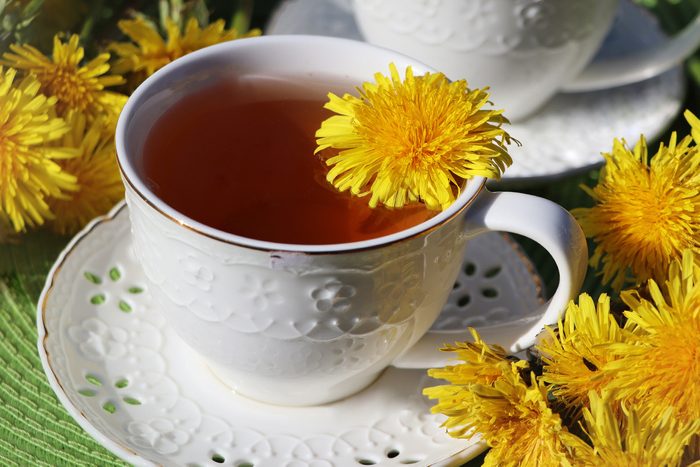
1. Dandelion tea
Dandelion tea is a popular herbal option for those looking for how to lose water weight naturally. Often used in alternative medicine as a natural diuretic, it’s believed to signal the kidneys to release excess water and sodium, which may help reduce bloating. However, Zumpano notes that while dandelion is commonly used to address water retention, it is still poorly studied and not routinely recommended in traditional medical practice.
How to drink: Start with one cup and gradually increase to two or three cups per day as needed. Steep dried leaves or a tea bag in hot water for five to 10 minutes. For the best quality, opt for organic brands and those that use plastic-free, eco-friendly tea bags.
Caution: Avoid if allergic to ragweed or on lithium or prescription diuretics.
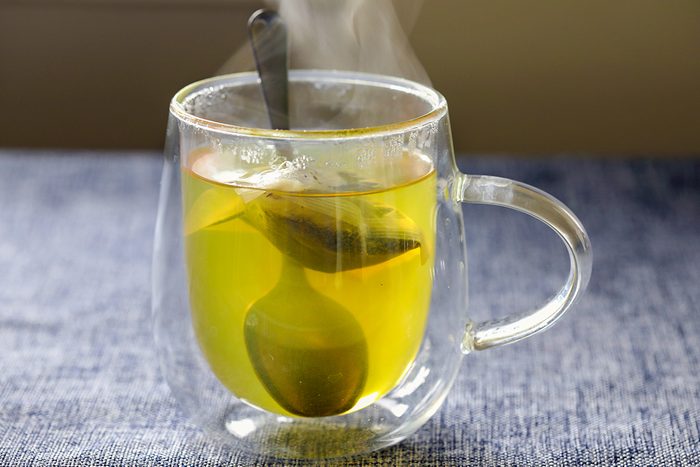
2. Green tea
Green tea is another effective option for shedding water weight, according to Zumpano. Green tea contains caffeine, a natural diuretic that can help increase urine output and reduce fluid retention. It’s also rich in catechins—antioxidants that may support fluid balance and help reduce inflammation.
How to drink: Two to three cups daily, spaced out. Brew loose-leaf or bagged green tea with hot (not boiling) water to preserve antioxidants.
Caution: Limit if you’re caffeine-sensitive. Avoid drinking close to bedtime. Also note that research in 2022 suggested that in some cases, green tea may have implications on the liver.
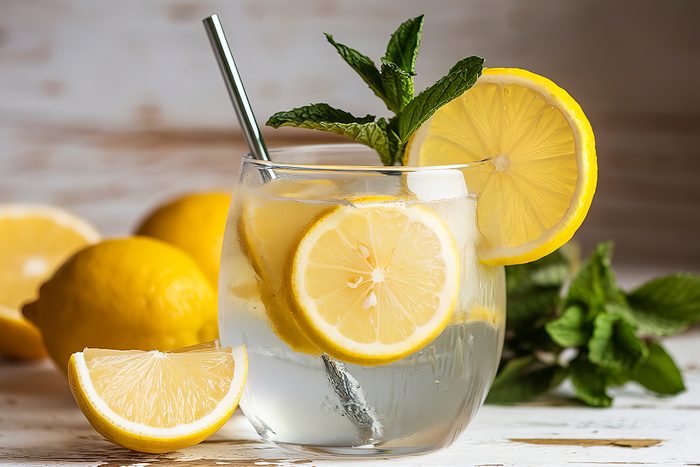
3. Lemon water
Lemon water is a tried-and-true bloat remedy. The vitamin C and potassium in lemon may encourage a mild increase in urine output, and many people find warm lemon water in the morning helps get their digestion moving as well. Perhaps most importantly, lemon makes plain water tastier for some, encouraging you to drink more. (Some doctors say drinking lemon water regularly can help break up the formation of kidney stones.)
How to drink: Squeeze half a lemon into eight to 12 ounces (oz) of water and sip throughout the day. Drink a glass first thing in the morning to kickstart hydration and digestion.
Tip: Rinse your mouth afterward to protect your tooth enamel.
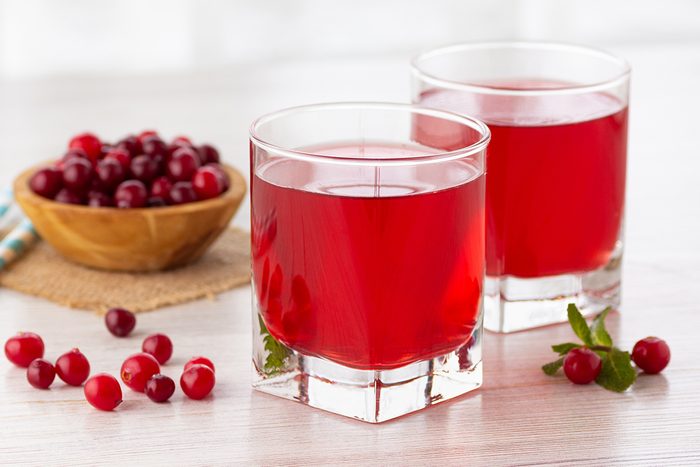
4. Unsweetened cranberry juice
If you’re looking for another drink option to shed water weight naturally, 100% pure, unsweetened cranberry juice may be worth a try. Zumpano notes that some studies suggest this tart juice “can aid as a diuretic, mildly increasing fluid output.” In addition to supporting water loss, cranberry juice is commonly used for urinary tract health and contains antioxidants that help support kidney function.
How to drink: Four to eight ounces per day, or dilute one to two tablespoons of concentrate in water.
Caution: Avoid cranberry drinks with added sugar. These may not be suitable for those prone to kidney stones.

5. Cucumber water
Cucumber water is one of the most refreshing and hydrating drinks to help reduce water weight. Cucumbers are high in water content and rich in potassium, which “may help with fluid retention,” explains Zumpano. For a similar effect, she adds that lettuce and even lettuce water can offer the same bloat-reducing benefits.
How to drink: Infuse a pitcher of water with cucumber slices and refrigerate. Sip all day. You can also blend cucumber with water for a refreshing juice.
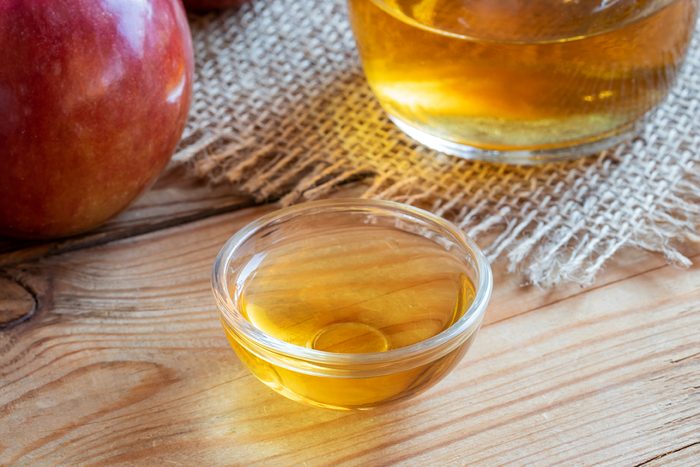
6. Diluted apple cider vinegar (ACV)
While not considered a traditional diuretic, apple cider vinegar (ACV) has long been used as a natural remedy for bloating and digestive discomfort. Anecdotal evidence suggests it may help relieve bloating and support mild laxative effects, which could contribute to temporary water loss. However, scientific research on its effectiveness for reducing water weight remains limited.
How to drink: Mix one to two tablespoons in eight ounces of water, once or twice daily. Consider adding lemon or honey to enhance the taste.
Caution: Always dilute. May irritate the stomach or reduce potassium if overused. Rinse mouth to protect teeth.
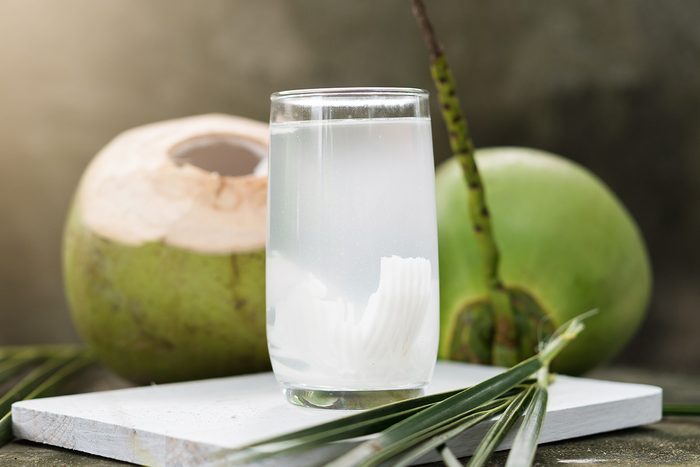
7. Coconut water
Coconut water is a great drink for shedding water weight, thanks to its high potassium content that helps flush out excess sodium and fluid. According to WebMD, a single cup can provide over 500 milligrams (mg) of potassium, making it an effective way to restore electrolyte balance and ease bloating after a salty meal or intense workout.
How to drink: One to two cups daily; choose 100% pure, unsweetened versions. Serve chilled or add a squeeze of lime.
Caution: Contains natural sugar; drink in moderation.
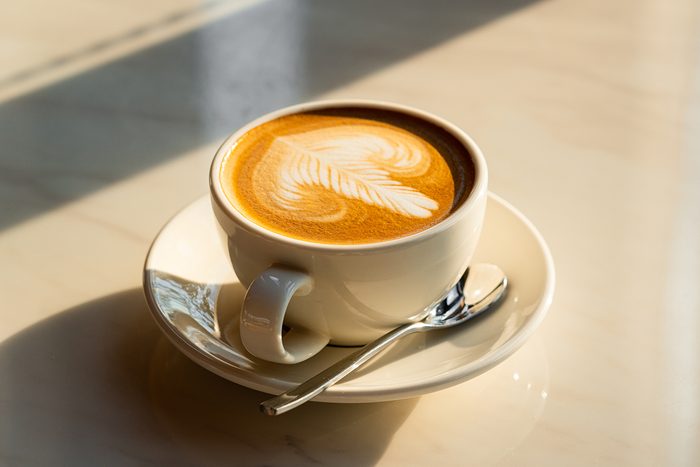
8. Coffee
Zumpano says that coffee is another option to help shed water weight, thanks to its caffeine content. A standard eight ounces cup of brewed coffee contains about 95 mg of caffeine, though the exact amount—and its impact—can vary depending on how much caffeine you consume throughout the day.
How to drink: Aim for one to two cups of black coffee daily, preferably in the morning to avoid disrupting your sleep cycle.
Caution: Be mindful of your total caffeine intake. The FDA recommends no more than 400 mg of caffeine per day for most healthy adults. Skip sugary or flavored coffee drinks, which can contribute to bloating due to added sugar and sodium. Always pair coffee with plenty of water to stay properly hydrated.
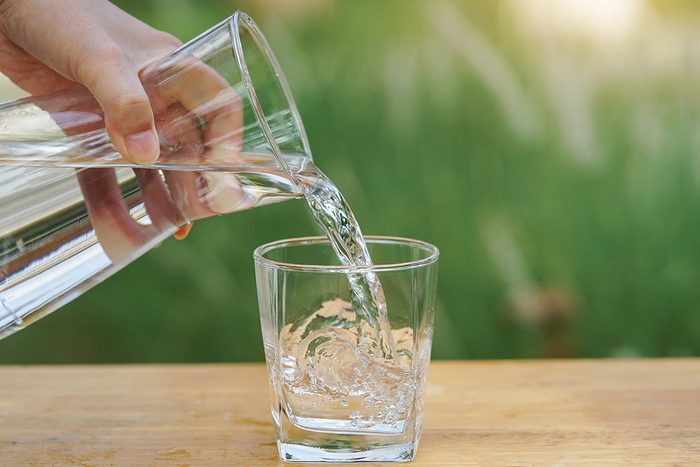
9. Plain water
When it comes to how to lose water weight naturally, plain water is the most essential drink of all. While it might seem counterintuitive, drinking more water actually helps your body flush out excess fluid, especially if your bloating is due to dehydration. “Proper hydration [with water] keeps your kidneys functioning at their best,” says Zumpano.
How to drink: Most experts recommend eight to 10 glasses per day (or half your body weight in ounces). Drink steadily throughout the day.
Pro tip: Add citrus, mint, or cucumber for flavor. Use a refillable water bottle to stay on track.
Other tips for losing water weight
Beyond beverages, “lifestyle factors play a big role in avoiding fluid retention,” shares Zumpano. In addition to staying hydrated, here are her expert tips to help lose water weight naturally:
- Limit sodium: Reducing salt and cutting back on processed foods can significantly minimize fluid retention.
- Eat potassium-rich foods: Potassium helps counteract sodium and flush it from the body. Great sources include coconut water, orange juice (look for no added sugar), bananas, leafy greens, potatoes, lentils, and tomatoes.
- Exercise and sweat: Regular movement and sweating—whether through workouts, sauna sessions, or steam rooms—can help your body release excess fluid and prevent retention.
- Boost magnesium intake: Magnesium is essential for fluid balance and hydration. Incorporate foods like spinach, chia seeds, almonds, beans, salmon, and dark chocolate for a natural boost.
- Reduce refined carbs: Eating white bread, pasta, and sugary snacks increases glycogen stores, which hold water and contribute to bloating.
- Avoid gimmicky diuretics: Drinks like “flat tummy” teas may promise fast results but often rely on harsh laxatives or unregulated herbs that can lead to dehydration and electrolyte imbalances. Experts suggest skipping them in favor of whole foods and proper hydration.
- Be cautious with over-the-counter water pills: While OTC diuretics may offer short-term water loss, they can disrupt electrolyte levels and lead to side effects. Unless prescribed by a healthcare provider, they’re not recommended for regular or casual use.
When to see a doctor
For most healthy people, occasional water retention is a temporary nuisance that can be managed at home with hydration, movement, and dietary adjustments. But in some cases, water weight can be a symptom of something more serious. See a doctor if you experience:
- Swelling in one limb or sudden puffiness that doesn’t improve
- Shortness of breath, chest discomfort, or unexplained rapid weight gain
- Ongoing bloating despite diet and hydration changes
Doctors can assess the cause through blood work, heart or kidney tests, and may prescribe diuretics if medically necessary. Persistent or unexplained swelling should always be evaluated by a healthcare provider.
For daily wellness updates, subscribe to The Healthy by Reader’s Digest newsletter and follow The Healthy on Facebook and Instagram. Keep reading:
- This One Exercise Can “Significantly” Reduce Waist Size and Weight, Says New Study
- 7 Ways To Lose Weight Without Exercise, from a Doctor of Obesity Medicine
- How Much Weight Can You Lose on Semaglutides? Board-Certified Obesity Doctors Explain
- Does Losing Weight Lower Blood Pressure? A Doctor of Obesity Medicine Responds




















